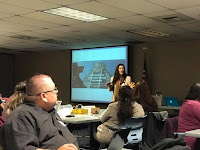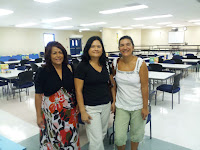 Today, technology is a bullet train and rapidly transforming every sector in society. Disruption is evident in companies like Airbnb and Lyft that have completely rearranged how we vacation and commute. This disruption not only shifts what we do, but impacts our mindset, as well. We think differently about lodging when we vacation now. Our boundaries and expectations change when we order a ride. So, when we think of the disruption technology has caused in education, we must ask ourselves: What is the mindshift that accompanies this change?
Today, technology is a bullet train and rapidly transforming every sector in society. Disruption is evident in companies like Airbnb and Lyft that have completely rearranged how we vacation and commute. This disruption not only shifts what we do, but impacts our mindset, as well. We think differently about lodging when we vacation now. Our boundaries and expectations change when we order a ride. So, when we think of the disruption technology has caused in education, we must ask ourselves: What is the mindshift that accompanies this change?
What often makes this feel uncertain is how new these learning spaces are to us - we have never had such a strong disruption in our learning culture before in formal education. This disruption asks us to rethink the role of the teacher, students, administrators, the tools that we use, the space we learn in, the time when we learn -- everything has been upended and is being reevaluated to best serve the needs of the 21st century. What makes this shift unique is that the impact is not just on the school environment, but it impacts the home learning culture as well. How do we engage parents in a learning shift that we are still unsure of how to navigate ourselves?
 |
| Workshop on ed tech for families |
Here’s why this is important work and why it is imperative we include families in our learning spaces at schools: Kids go home somewhere! And wherever that home is, there is a learning space there. If it doesn’t mirror the learning space students experience in school, then they don’t know whom to listen to - their parents or their teachers?
This conundrum has practical implications. As educators, we know that students need to think critically, and, in order to do this, they need to learn to question and, to dig deep into a problem or idea and try to uncover the why. It is an incredible skill to develop and will help the world uncover truths that are sorely needed.
I want to go to my friend’s house tonight. You can’t go. Why not? Because I said so.
Whoa, why are your grades so bad?! I don’t know. That’s just an excuse. You need to try harder.
When we don’t include families in the conversation of learning that we are having, they will not know the powerful impact these type of answers can have on their child’s brain and thinking patterns. If we shared with families the learning we are having around the power of questions and the importance of repetition and emotion in developing strong brain patterns and synapses, their conversations could be more meaningful:
I want to go to my friend’s house tonight.
Tell me more about your plan. Why is tonight important?
Whoa, why are your grades so bad?!
I don’t know.
Let’s look at each one and tell me more about the class and what is making it a challenge.
 |
| Parent workshop on technology |
When you integrate technology into the learning culture, it is imperative to involve families in this conversation. They, too, wonder how these new tools support learning and often believe that technology is just for playing. So, when kids come home with school-assigned devices and are watching videos for homework, parents don’t understand that this is part of the flipped classroom. Or, when kids come home with their school devices and are chatting in online classrooms, parents don’t understand that this is a powerful way to develop academic discourse. Including families in relevant trainings about the disruptions happening in our learning cultures empowers them to be active participants in this learning shift.
 |
| Author with district parent leaders |
No comments:
Post a Comment